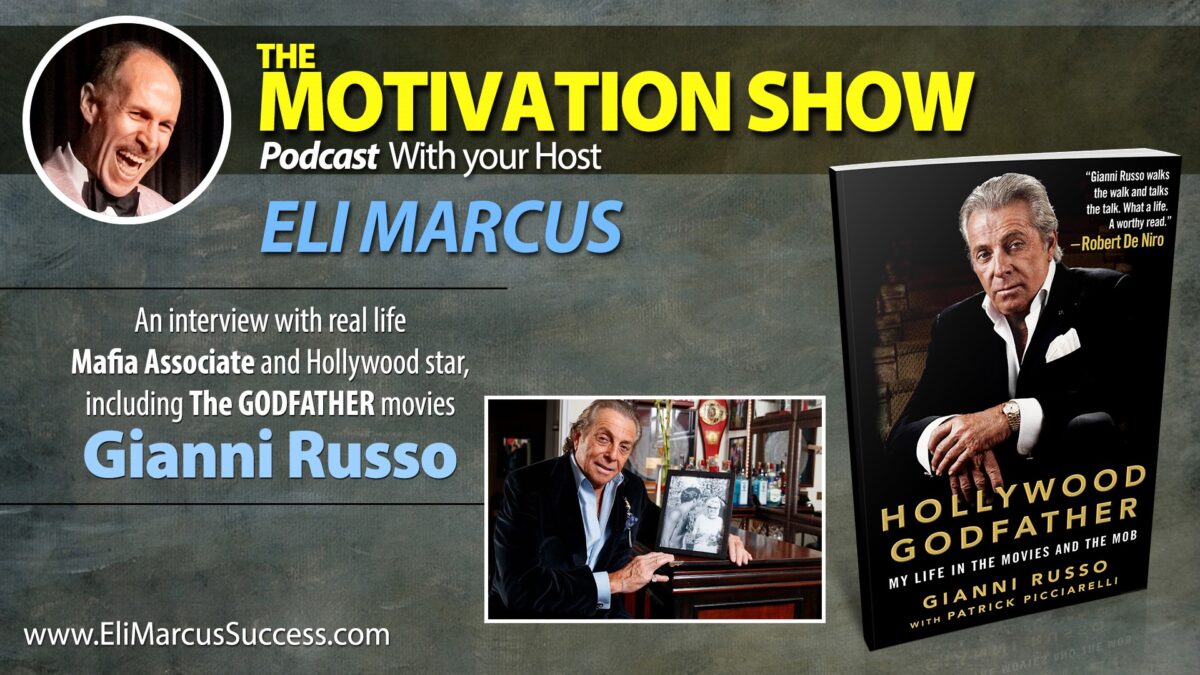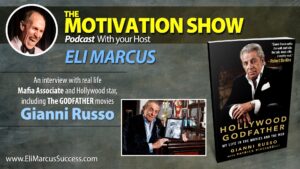
Gianni Russo is a colorful character in real life as well as in the numerous movie roles he played. Best known for his role as Carlo Rizzi in the original 1972 film The Godfather, Russo sat down with me for a chat about his tell-all book Hollywood Godfather: My Life in the Movies and the Mob which describes in vivid detail his dual life in the movies and in the real life mob as a mafia associate. Wait til you hear about some of the incredible people he palled around with including some of the infamous ladies he was…well…let’s just say he was associated with.

When asked what it is what like growing up and how did he get involved with the mob, Gianni says he grew up on Mulberry Street in Little Italy and in 1949, he became bedridden and quarantined with polio for five years. Who was Gianni’s nurse in his ward at Bellevue? Carlo Gambino’s niece he says! Destiny? His primary source of entertainment and distraction from his distressed and depressed state was a transistor radio. When he turned on the radio, he discovered Frank Sinatra was born the same day. He says Sinatra became his mentor and singing teacher. Gianni met a guy Sinatra knew by the name of Frank Costello (not to be confused with Lou Costello), the infamous mob boss of the Luciano crime family. Gianni used to sell ballpoint pens in front of the Sherry Netherland hotel and Costello would go there every morning for a shoe shine. “He gave me some money, some words of advice…and never took a pen (I’d hate to think where that pen may have eventually ended up if he did). I stuck with Costello til the day he died in 1973.” Right behind Gianni as we spoke on Zoom was a dining room table that can seat 16 people. As a different kind of wise guy that I am, I quipped about “if only that table could talk,” oh what interesting tales it can tell. Gianni found that amusing and said jokingly “I would be indicted again.” Oops. I asked Gianni to further elaborate on what exactly a Mafia Associate actually entailed. “That’s why I never got locked up. Carlo Gambino and Costello made sure that I was only a messenger.” He said he was even registered as a bona fide messenger and courier registered with Lloyd’s of London…pretty clever if you ask me.
What about this famous code of silence and why did wise guys start signing like canaries, I ask? The new RICO laws (The Racketeer Influenced and Corrupt Organizations Act) enacted in 1970 changed everything. “The feds were allowed to take all of the assets you acquired while being in the mob. Omerta went out the window. Everybody became singing canaries. That’s why these guys started flipping.”
What were the rules that Gianni knew to live by to keep Frank Costello on his good side? “Don’t lie to me. Be on Time. Talk to Nobody.” In the late 1990’s, I once flew Don Miguel Ruiz, the author of “The Four Agreements” to New York to promote his mega bestselling book. With these new rules, I can now write a new book destined to be a bestseller called “The Three Agreements: A Mafia Guide to Not Getting Rubbed Out”…bada boom!
At the age of 25, Gianni came out of nowhere and was cast in the original Godfather movie as Sonny Corleone’s brother-in-law. How did he feel about getting that plum role? “I am making a couple of thousand dollars a week already. I just wanted to do it for ego.” Gianni says that after 45 minutes of rehearsal one day, Brando tells Coppola he has to rethink the part. Gianni puts his arm around Brando and says dead seriously “You get me fired, I will suck on your heart. You will bleed out here right now.” Brando’s reaction? Gianni says Brando told him “That was brilliant!” To Gianni’s amusement, he says Brando “thought I was acting.” I ask Gianni who is the most interesting person he worked with in his film career. “Brando! He was so generous.”
Then there’s the famous nightclub Gianni owned in Sin City, and the night where he shot and killed in self-defense, unknowingly, a henchman of notorious Columbian drug lord Pablo Escobar and had to survive the hit that was put out on him. Perhaps the most remarkable revelation among many, was his relationship with Marilyn Monroe. What became of his dalliance with Hollywood’s most glamorous starlet of the day? You will have to listen to my podcast to find out in an ending that even Hollywood couldn’t come up with!
You can listen to the Gianni Russo interview on The Motivation Show C-Suite Network Radio https://c-suitenetwork.com/radio/shows/the-motivation-show/ or any podcast listening platform To contact Eli, email motivatea2z@gmail.com.


